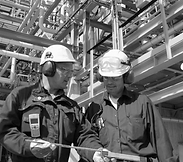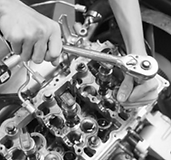Engineering and Technology Quarterly Reviews
ISSN 2622-9374




Published: 22 September 2022
Fabrication of Multilayer Nanowires (Ag/Co/Zn) by Electro-Chemical Deposition in the Anodic Aluminum Oxide Template
Ibrahim Tawana, Hussein Aziz, Mohammad Dad Saay, Awaz Bromand
Bamyan University (Afghanistan), Ghor institute of higher education (Afghanistan)

Download Full-Text Pdf
10.5281/zenodo.7099893
Pages: 46-49
Keywords: Multilayer, Anodize and Nanowires
Abstract
In this article, multilayer nanowires (Ag/Co/Zn) were produced by electrochemical deposition in the form of anodic aluminum oxide. The electrochemical deposition method to produce nanowires are performed by three different methods. We have examined the pulsed periodic method, and we have managed to fabricate the nanowires of Ag/Co/Zn. Then, the produce nanowires are confirmed by the SEM and XRD analyses. Anodic nanoporous alumina with a thickness of 205 nm and a distance between pores of about 250 nm is produced by combining hard and soft anodization. Two-step anodization method including soft anodization and hard anodization was performed. These two anodizations were performed using 0.3 M oxalic acid as electrolyte at 0 degrees Celsius and applying voltages of 40 and 130 volts, respectively. Then the potential was reduced from 130V to 12V to thin the barrier layer. Multilayer nanowire arrays had been electrodeposited into the pores of anodic aluminum oxide (AAO) template. The electrochemical impedance spectroscopy has been carried out to study the in situ growth process of multilayer nanowires at different electrodeposition times.
References
Baibich, M. N., Broto, J. M., Fert, A., Van Dau, F. N., Petroff, F., Etienne, P., & Chazelas, J. (1988). Giant Magnetoresistance of (001)Fe/(001)Cr Magnetic Superlattices. PHYSICAL REVIEW LETTERS, 61, 2472. doi:https://doi.org/10.1103/PhysRevLett.61.2472
Blondel, A., Meier, J. P., Doudin, B., & Ansermet, J. P. (1994). Giant magnetoresistance of nanowires of multilayers. Applied Physics Letters, 65(23), 3019. doi:https://doi.org/10.1063/1.112495
Chaure, N. B., Stamenov, P., Rhen, F. M., & Coey, J. M. (2005). Oriented cobalt nanowires prepared by electrodeposition in a porous membrane. Journal of Magnetism and Magnetic Materials, 290(2), 1210-1213. doi:https://doi.org/10.1016/j.jmmm.2004.11.387
Garcia, J., Vega, V., Prida, V. M., Hernando, B., Barriga Castro, E. D., Resendez, R. M., & Iglesias, L. (2014). Template-assisted Co–Ni alloys and multisegmented nanowires with tuned magnetic anisotropy. Application and Materals Science, 211(5), 1041-1047. doi:https://doi.org/10.1002/pssa.201300731
Gong, J., Riemer, S., Kautzky, M., & Tabakovic, I. (2016). Composition gradient, structure, stress, roughness and magnetic properties of 5-500 nm thin NiFe films obtained by electrodeposition. Journal of Magnetism and Magnetic Materials, 398, 64-69. doi:https://doi.org/10.1016/j.jmmm.2015.09.036
Mohanty, U. S. (2011). Electrodeposition: a versatile and inexpensive tool for the synthesis of nanoparticles, nanorods, nanowires, and nanoclusters of metals. Journal of Applied Electrochemistry, 41, 257–270. doi:https://doi.org/10.1007/s10800-010-0234-3
Peng, C. H., Wu, T. Y., & Hwang, C. C. (2013). A Preliminary Study on the Synthesis and Characterization of Multilayered Ag/Co Magnetic Nanowires Fabricated via the Electrodeposition Method. The Scientific World Journal, 2013, 1-3. doi:https://doi.org/10.1155/2013/837048
Schwarzacher, W., & Lashmore, D. S. (1996). Giant magnetoresistance in electrodeposited films. IEEE Transactions on Magnetics, 32(4), 3133 - 3153. doi:10.1109/20.508379
Szozstko, B. K., Orzechowska, E., & Wykowska, U. (2013). Organophosphorous modifications of multifunctional magnetic nanowires. Colloids and Surfaces B: Biointerfaces, 111, 509-516. doi:https://doi.org/10.1016/j.colsurfb.2013.05.033
Torabinejad, V., Aliofkhazraei, M., Assareh, S., Allahyarzadeh, M. H., & Rouhaghdam, A. S. (2017). Electrodeposition of Ni-Fe alloys, composites, and nano coatings–A review. Journal of Alloys and Compounds, 691, 841-859. doi:https://doi.org/10.1016/j.jallcom.2016.08.329
Winkler, K., Zolopa, M. W., Oleksicka, M. M., Recko, K., Dobrzynski, L., Stork, J. R., & Balch, A. L. (2008). Variations in the crystalline deposits formed upon electrochemical oxidation of the anions, [Ir(CO)2X2]− (X = Cl, Br, and I). Electrochimica Acta, 53(24), 7288-7297. doi:https://doi.org/10.1016/j.electacta.2008.04.011



